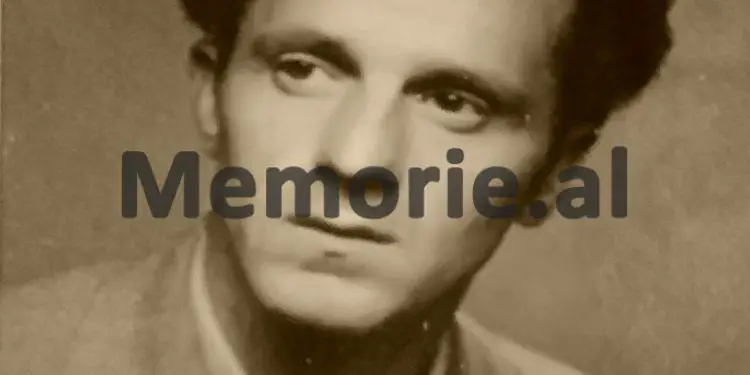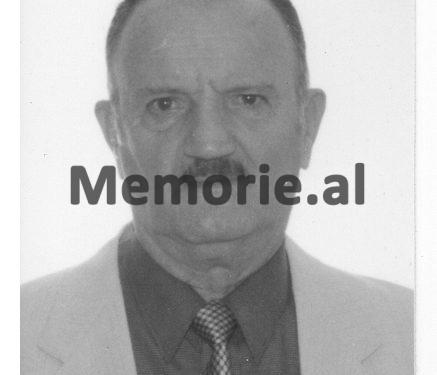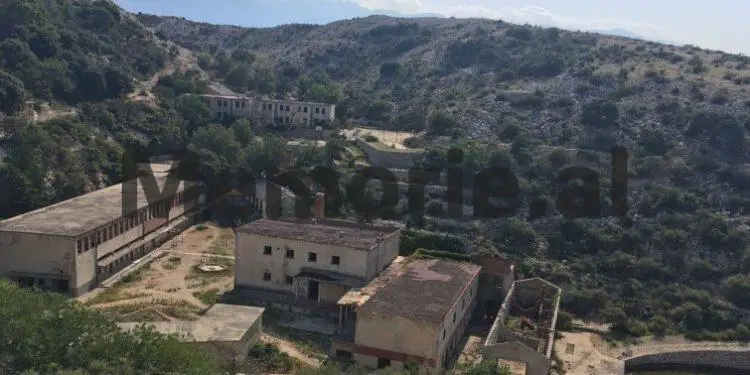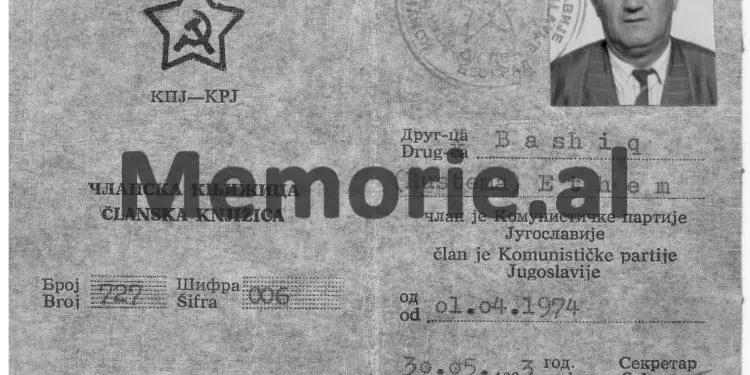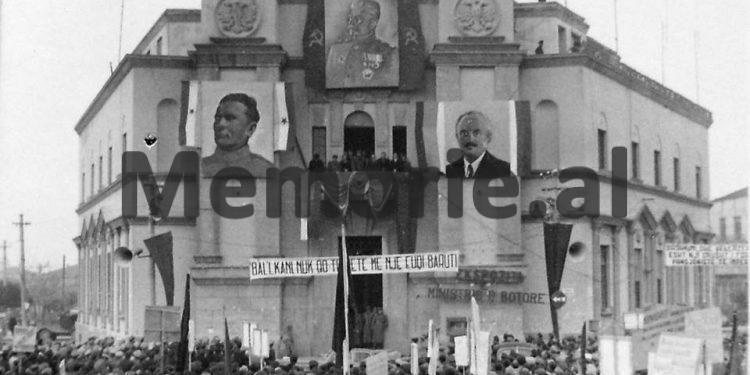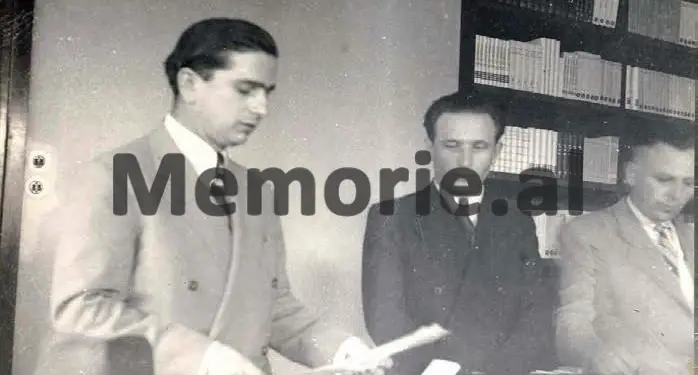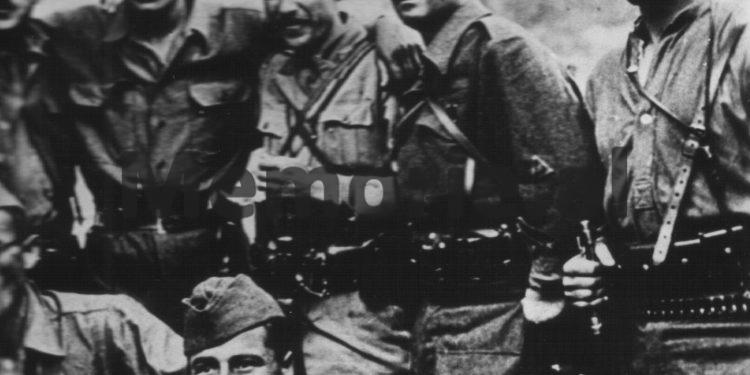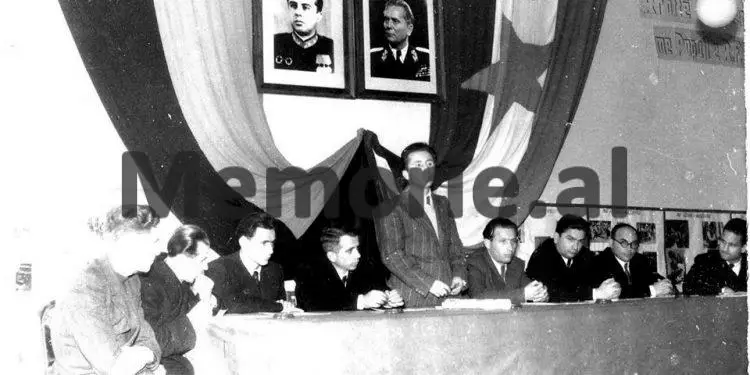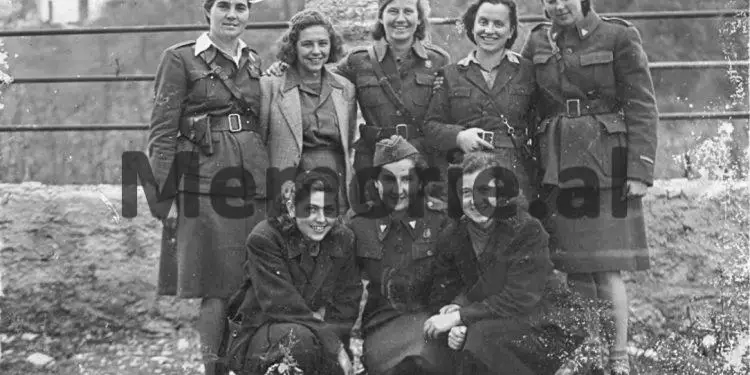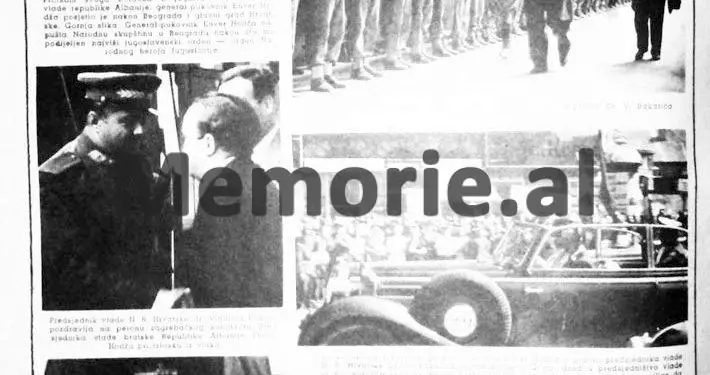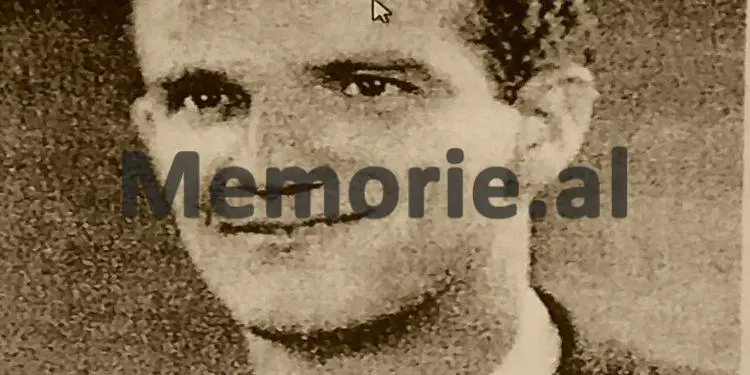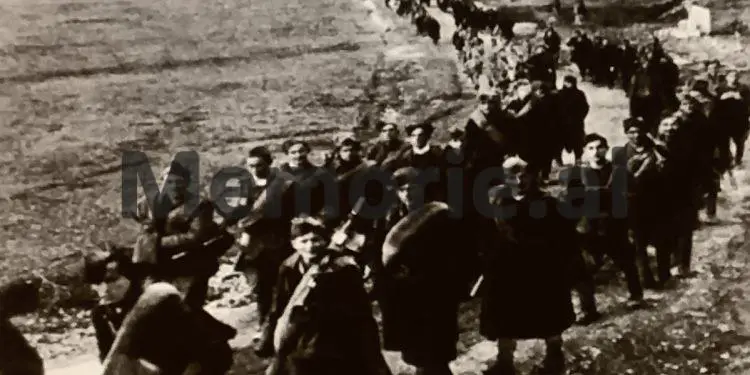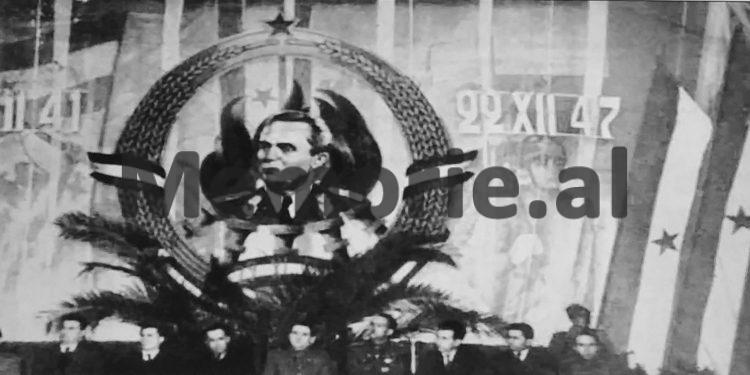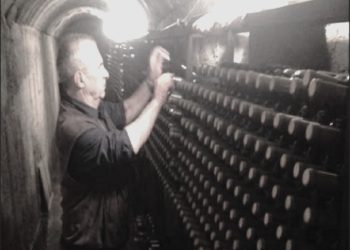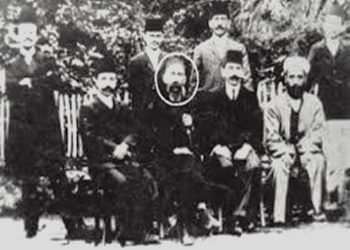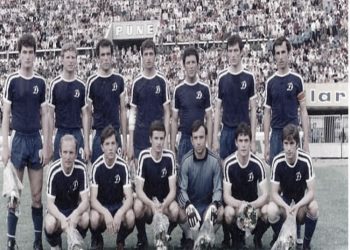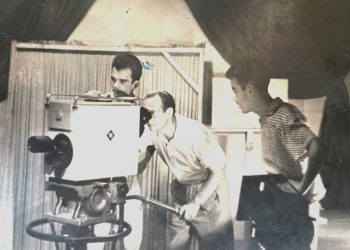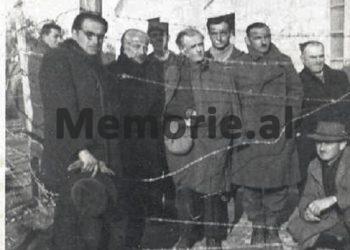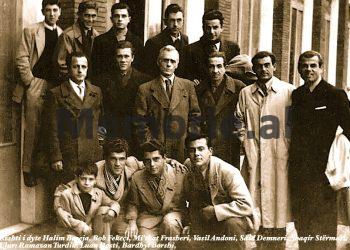Dashnor Kaloçi
Memorie.al publishes the unknown story of Et’hem Baiqit, originally from Plava e Gucisë, whose family during the War period, 1939-’44, was closely associated with the Anti-Fascist Movement in Yugoslavia, and his brother, Beqo, as 1938 communist, was elected as the main leader of the Communist Party of Yugoslavia for Montenegro, for which he was imprisoned by the Italians and interned in the Peqin camp in Albania, where he also met Miladin Popovic. Et’hem joined the Yugoslav Communist Party and won a scholarship in 1949 to pursue higher studies in Hydro-Biology in Novi Sad Zemjanina, where he was arrested by the UDB and imprisoned in Goli Otok. accused of distributing anti-Semitic literature suppressed in Moscow by the Yugoslav political diaspora. The Yugoslav UDB pressures that forced Bashic to fictitiously sign cooperation with them and release him from prison and escape to Albania, crossing the border in the Çerem area of the Tropoja district where he was held and sheltered by the Çela family. Surrender to the competent authorities accusing him of being a UDB agent and subsequent internment in the camp of the village of Llakatund in Vlora, where the Yugoslav anti-Semitic emigration took place, and then sent to continue his higher studies at the Higher Agricultural Institute in Kamza, according to the order of Wilson Pecani and Rita Markos.
“After I refused, categorically to be recruited by the Yugoslav secret service, two UDB officers came to my cell putting psychological pressure on me and shooting me with a pistol, with maneuver bullets. But after all that pressure and blackmail, I did not break, so they transferred me to Goli Otok prison where there were about 600 others, but even there in prison, the UDB officers continued to blackmail me to sign cooperation with them. I consulted with my friends, they told me to sign the declaration and immediately flee to Albania “. This is how Et’hem Bashiqi, originally from Plava e Gucisë, remembered his painful story with the UDB organs and his escape from Yugoslavia to Albania in 1950. But, like many other Albanians living in the lands of their ethnicity in Yugoslavia of that time who came to Albania to escape Serbian repression, did not understand that “from the rain, they were falling in hail”?! This seems to have happened to Et’hem Baashiiq as well, where after his arrival in Albania, the State Security organs suspected that he was a UDB agent and sent on a mission by them, and held him for some time in Llakatund camp in Vlora. Regarding these and his history, from the origin of the family and how his fate went in the communist Albania of Enver Hoxha, we know Mr. Bashiqi, in his exclusive interview that Memorie.al publishes in this article.
Mr. Et’hem, first of all can you tell us a little about your family background?
I was born in 1924, in Plava i Gucisë, in Montenegro, where the first of my tribe lived for half a century. The early origin of my family is from the villages of the district of Lezha, when during the rule of the Bushatllinj, they had moved from there for problems of enmity with the Kelmendi tribe.
How many people did your family consist of?
I am the fifth child, out of six sons and two daughters that my father, Rustem Bashiqi, had, who at that time was very well known as a craftsman and was engaged in sewing Albanian national costumes.
What do you remember from your childhood and from the time of the invasion?
I received my first primary education in my hometown, from where other educational cycles in the city of Berane would follow. During the years of Nazi-Fascist occupation of Yugoslavia, my family, Bashiqi, became closely associated with the Communist Movement, as my brother, Beqo Bashiqi, was a communist of 1938, and the main figure of the Yugoslav Communist Party for the Plava and Guca area. During this period, Beqo was elected Organizational Secretary of the Yugoslav Communist Party for all of Montenegro. For this reason, he was imprisoned by the Italians and sent to Peja and then to the internment camp in Peqin. There he met many other anti-fascists, including Miladin Popovic.
And then how did your brother’s story go?
He was released from this camp in 1942, after the Montenegrin communists, paid a large sum of money. After that, Beqo joined the Yugoslav Communist Youth in 1943, and three years later, was admitted to the ranks of the Communist Party of Yugoslavia led by Josip Broz Tito.
What about you, did you engage in these party instances?
I joined the Yugoslav Communist Party and was accepted by Ibrahim Rexhepagic, a Party member who was friends with my uncle. Both of them were killed during the Anti-Fascist War and were declared martyrs, after my uncle was killed fighting against the forces of Prek Cali in aid of the Albanian partisans who had surrounded them in the mountains of Malësia above Shkodra where they were sheltered.
But after the war, how did your flow continue?
After World War II, as I had completed five classes in Berane, I was given the opportunity to go as a Montenegrin scholarship holder to Novi Sad, Vojvodina, which was then under Serbia.
What did you study for?
On March 3, 1949, while attending the high school for Hydro-Biology in Zemjanina, I left for Zemun, Belgrade, where two UDB officers put pistols on my head and threw handcuffs at me. After I was arrested, I was sent to the “Franjo Josif” prison in Zemjanina, where I was locked in a cramped cell.
What were the reasons for your arrest?
From day one, they questioned me and accused me of distributing anti-Semitic newspapers, such as “Napred” and “Socialist Yugoslavia”, which were printed in Moscow by the Yugoslav anti-Semitic political diaspora. Following these allegations, they proposed that I cooperate with the UDB in detecting clandestine organizations.
After the proposal they made to you, what did you decide?
If I did that, they would send me back to school and I would have other favors. But I categorically rejected it and they told me: “Our state gives you a scholarship of 5 thousand dinars per month, and you put the knife behind the back of our Party”! A few days later, a party secretary came to my cell and expelled me from the Yugoslav Communist Party on the basis of its statute. After I refused to be recruited by the UDB, two of its officers came to my cell, putting psychological pressure on me, shooting me with a handgun. During this time, next to my cell was the former Nazi Gestapo chief for Vojvodina, Shpiler. He taught UDB officers many tortures unknown to them, which during the War were successfully used by the German Gestapo, not only in Yugoslavia, but wherever they had been as invaders.
What happened after your rejection of the proposal they made to you?
Even after all those blackmails, I did not break, and they transferred me to the infamous Goli-Otok prison, where along with me, were 600 other citizens of different nationalities of Yugoslavia. But even there in prison, the UDB officers continued to blackmail me into signing a co-operation with them. After I consulted with my friends, they told me to sign the statement and immediately flee to Albania.
What did this statement contain, and did you sign it?
I would only formally sign the statement, so I signed the statement of cooperation with UDB and they assigned me the place and time of the meeting to their offices.
What happened at that meeting?
There I would receive instructions for detecting clandestine groups operating against Tito in Yugoslavia.
After signing the collaboration, did they set you free?
After I was released from Goli – Otoku, I went to my hometown, where I showed up at the UDB offices to take up duties.
What were these tasks?
I did not immediately show up at their offices as I told them I would meet the people of the house first. At that time, I met Mihajlo Bokic, who had been a veteran fighter and former MP from Plava.
What did you discuss with Mihajlo Bokic?
We both made the plan to escape to Albania and we hastened our plan, after several murders that took place at that time.
When did you escape and at what border point did you decide to cross?
On February 19, 1950 I dressed well and after taking a pistol and some bombs, I went to the Albanian border in the area of Çerem in the district of Tropoja, where after staying alone for three days in the snowy mountains, I took refuge with the Çela family, who I was very well received. The next day they escorted me to the winter border post, where I was received by an officer from Vlora who had studied in the Soviet Union.
How were you received at the border crossing and what was asked?
I communicated with that officer in Russian, as I did not know the Albanian language very well. From there I was escorted to the Tropoja Branch of Internal Affairs, where I was detained for 15 days. They pressured me to admit that I was an agent of the UDB and unfortunately there I faced the same methods and tactics that the UDB had previously done to me in the Goli-Otok prison.
After these pressures, where did they take you?
Then they sent me to Tirana, where they kept me for another 15 days asking me the same questions. But after they were convinced that I was not an agent of the UDB, they sent me to the village of Llakatund in Vlora, where there were many Yugoslav emigrants who had sought political asylum in Albania.
What about Llakatund, did you have or did you find any acquaintances?
During this time, I escaped from a UDB trap, which had been set up by a ballista from Drenica, who was there with us.
Specifically, what trap?!
It is a past and a closed problem, and I do not want to go back to remember it.
How many years did you stay in Llakatund?
I stayed in Llakatund until 1952, when I was released and went to Tirana to pursue higher studies.
You were released, did not immediately have any problems?
I was released in 1952 after the State Security convinced me that I was not an agent of the UDB and that the latter had destroyed my family by killing my brother, Halim, through an assassination attempt. At that time, I was called Vilson Pecani and Rita Marko, who communicated to me the rehabilitation by the ALP and told me that I was assigned to continue my higher studies at the Agricultural University of Kamza.
After graduation, where did you settle down?
After I finished my studies, I was assigned to go as a teacher in Divjaka, Lushnja. In 1959, during Nikita Khrushchev’s visit to Albania, a group of Yugoslav political immigrants who had previously served in Tito’s army decided to draft a letter asking Khrushchev to help them fight the regime. and Josip Broz Titos.
Was this letter considered?
That letter was signed by 200 people, including me. At this time, we, as an immigrant representative, had a meeting with Ramiz Alia, whom we had known since the time of the War.
What did Ramiz promise you?
He promised us that the Albanian government, for its part, would do everything to realize our demands, but the final answer had to come from Khrushchev, as Albania was a small country and could not create conflicts with neighboring countries.
Did you receive any response to your request?
Two or three days later, we received a reply from Khrushchev, who stated that he could not wait for us due to the busy agenda.
Have you kept notes of all that you went through to publish in a book as evidence of a time when you faced two regimes?
I have written some memoirs from my life from time to time, but not with the intention of publishing them in a book, which I am giving to you who can publish them. Along with these notebooks where I have memories, I am also giving you this mesh bag that we have kept since the war, where my brother, Halimi, (who was assassinated by the UDB in 1951), kept his documents.
Mr. Bashiqi, thank you for everything.
Thank you from you for publishing these events, which will remain even after we have left this life. Memorie.al




